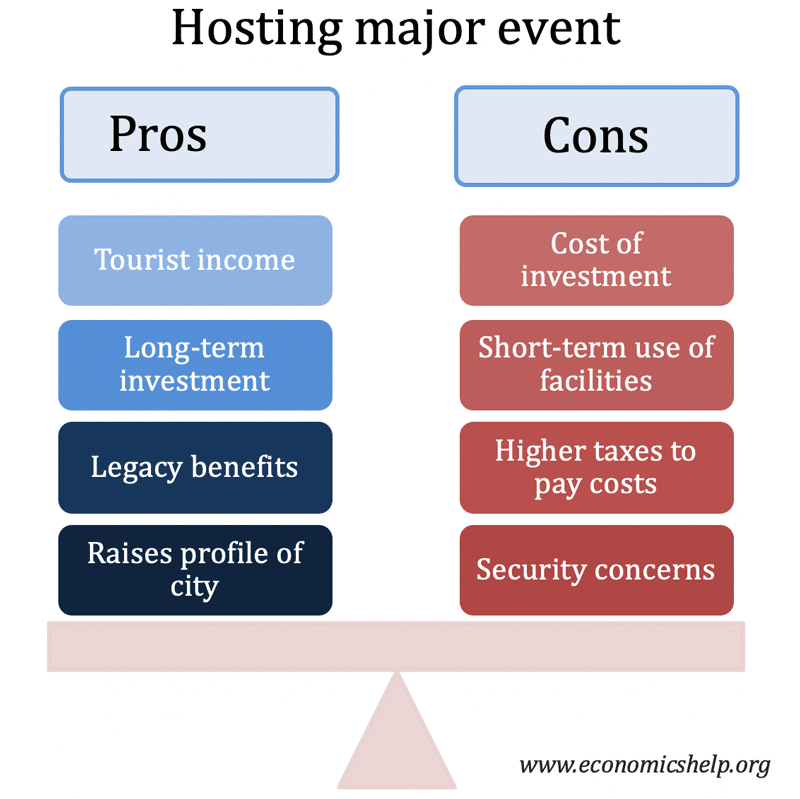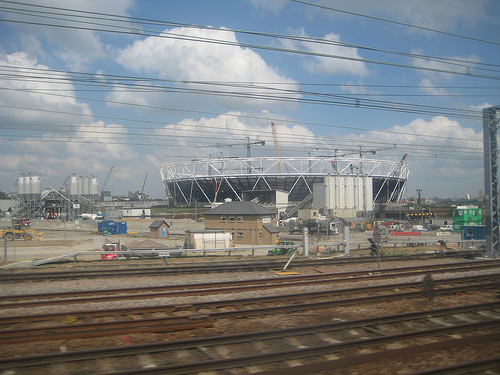A look at some of the advantages and disadvantages of hosting a major sporting event.

Hosting a major sporting event can give many economic, social and cultural benefits. However, the costs of hosting the event can also be quite high. What determines whether the benefits outweigh the costs?
Advantages of hosting a major event
1. Raise the profile of the city/country
Increasing the profile of a city can lead to lasting economic benefits. For example, cities which host the Olympics can be assured of a persistent increase in recognition and tourism. Barcelona, Sydney, Beijing have all seen this from hosting the Olympics. For a country like China with a controversial human rights record, hosting a major sporting event can be a way to gain greater international acceptance. When South Africa hosted the Rugby World Cup and later the Football World Cup, it was a defining moment in highlighting the new ‘post-apartheid’ South Africa. This raised profile can be important for giving economic benefits, such as attracting tourists and business investment. The importance of this point depends on the particular city. For South Africa, the World Cup made a big difference to perceptions of South Africa. For a city like London, which already has a very strong reputation, hosting the Olympics will be less influential. However, even hosting the Commonwealth Games can be beneficial for a city like Manchester, which benefited from hosting games, despite the persistent rain!
2. Long term investment
A significant benefit is the long-term investment which comes from preparing for a major event. The city/country will have a legacy of improved sporting venues. Also, cities will usually have to invest in infrastructure and transport to cater for an influx of tourists. For example, there has been significant investment in public transport projects around London. This will leave a lasting legacy for residents of London, especially East London. From the 2012 London Olympics, the east of London has benefited from improved public transport.
3. Jobs and Investment
The several years of planning and investment will help create jobs and can revitalise depressed cities. This was an important claim of the London Olympics, choosing a site in East London, which at the time was relatively depressed. It is estimated the London Olympics 2012, will create 8,000 full-time jobs and lead to a boost in economic output of close to £2bn [1]
4. Enthusiasm
It is often easy to find reasons not to host a major sporting event, too much debt, more important priorities. But, a major sporting event can create enthusiasm and excitement for such an event. It can help promote uptake of sport which has lasting benefits for the nation’s health. Also, a major sporting event can lead to a rise in volunteerism which promotes civic virtues.
5. Short term economic benefits
The Olympics will see a surge in visitors, athletes and media. This will provide an increase in spending and injection of money into the local economy. However, this injection of money, will only be short-term (a few weeks) and make little overall impact on the wider economy. Also, the injection of foreign visitors may be offset by locals leaving to avoid the influx and over-crowding.
Disadvantages of Hosting Major Sporting Events
1. The cost of building stadiums
To host a major sporting event like the Olympics can cost significant sums, which have to be paid for by the taxpayer. Costs of the Olympics have a tendency to rise over time and be much greater than expected. The Montreal Olympics was estimated to have cost $120 million (1970) and then rising to $310 million (1973). The final cost was around 13-times greater at $1.6bn. It took 30 years to pay off the Olympic debt [2].
2. Short-Term use
Many facilities built for the Olympics can never be fully used again. e.g. an 80,000 athletic stadium will rarely be full outside of the Olympics. This can be mitigated by careful planning. e.g. the London Olympic Stadium will be used by West Ham football team and was used for legacy athletic events such as the 2017 World Championships. Other Olympic facilities, like the Olympic village, will be converted into affordable housing. However, some cities which failed to plan for the legacy of the Olympic were left with unused giant stadiums.
3. Potential for negative publicity
If things go well, a city can benefit from positive publicity, but if things go badly, it can cause the opposite. For example, the Winter Olympics has received adverse publicity because of corruption and cost overruns. The football World Cup in Qatar could backfire if players complain about the heat and conditions of migrant workers. Delhi suffered negative publicity over the state of its facilities at the Commonwealth Games.
4. Cost of Security
Major sporting events increasingly have to implement higher levels of security. This is both costly and can restrict freedom of movement of local citizens during games.
5. Higher taxes to pay cost
Some cities have seen an increase in tax post games to finance a loss of putting on the sporting event. The post-games cost of London is uncertain. (BBC link) This increase in cost has made hosting the Olympics less politically popular.
6. Local business suffer due to major advertisers
To finance the Olympics, major corporate donors are given exclusive rights, which means many local suppliers are excluded from the events themselves. For example, there are official water suppliers, official fast food and official soft-drinks. If you don’t pay large sums, you will not be able to supply inside Olympic venues.
Should a country like the UK be hosting a major event with a large national debt?
In 2012, the UK’s national debt was over 62% of GDP. Annual Borrowing in 2011/12 is close to 10% of GDP. In these times of spending cuts, should we be spending money on a sporting event?
The investment and spending are important given the state of the economy. With unemployment close to 3 million, this investment helps create economic recovery. The investment has a potential for leading to higher growth and higher future tax revenues.
Evaluation – which cities benefitted?
Some cities have seen a long-term boost to tourist numbers from hosting a major event. In particular
- Barcelona (1992) – Left important to legacy to the city for being on the world stage.
- Beijing (2008) – Beijing Olympics was important for opening China to western tourists.
- Greece (2004) The Greek government say the Olympics cost €8.954 billion to stage and left a small net economic benefit.
In terms of cities which experienced high costs, and limited benefits
- Montreal Winter Olympics. (1976) Cost the government $1.5 billion — 13 times its projected cost — and the debt took 30 years to pay off.
- Rio de Janeiro Olympics (2016) Cost. 43.3 billion reais (£10.35 ), around 14.5 billion reais more than anticipated. During the Games, there were protests by the local population who felt that resources were being misused on the Olympics when their more pressing needs were being ignored.
Related


wow , good information. its really beneficial , I liked it
Interesting blog, good information given about the advantages of hosting a major event. And how it is benefited. Thanks for sharing the blog with us.
can you tell me the disadvantages of hosting a big event such as the commonwealth games or the 2020 olympics
Thank you so much for sharing in detail information about Pros and Cons of hosting major events. Most of the time we all gets super excited about these events but don’t think about all these impacts. Very Informative.
Do you know what the stadium is used for now?
what is the publisher of this article
Economicshelp.org (Tejvan Pettinger, Oxford UK)
Wow, I had no idea that hosting a large sporting event could have such a big impact on the city! I was watching the World Cup earlier this year and I wondered at the economic impact on the city that did the hosting. Thank you for information about how hosting will give the city and country a surge in visitors, media, and athletes as well as increased in spending into their local economy during the event.
Sporting events at the national and world level have been tanted by politics and greed. We all know about cheating by the Russians and the negative economic impact the Sochi and Rio olympics had on the local population. The economic local benefit is short term. The world we live in today has failed, through sports, to focus on world peace and hunger. Why do we need billion dollar sporting events and political flag waving? Lets focus on world hunger and world peace not who can run the fastest or jump the highest.
Hi Rick why target Russians in particular?. Why don’t you also comment on an excellent job they did for the World Cup 2018. Olympics Games and FIFA World Cup brings out the best amongst competitors. And its a great way for people from different nationalities or race to come together watch a game over a beer and forge friendships and great memories.
Your point is so irrelevant. This is a question on advantages and disadvantages of hosting a major event and not World peace/world hunger.
Thanks for this information
That is a good point that a sporting event can create enthusiasm that could give lasting benefits. That is something I would want to have around our state. This is something that would be good for someone to look into doing sometime soon to add to the list of events.
Thanks for mentioning that in order to create lasting economic benefits, a city needs to increase its profile. The city I live in is thinking of holding annual events because it’s considering inviting tourists from all over the country to see the benefits of living and doing business here. It seems like a good idea to consider hiring reputable professionals that have experience with hosting different events around town in order to expose the natural beauty of the area.
The information was very useful. I love how detailed everythig is and the fact that there’s a lot of examples.
This website is the best! I have all the info I need